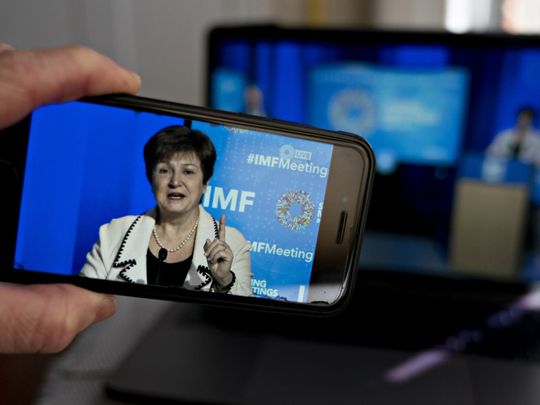
The International Monetary Fund’s (IMF) latest World Economic Outlook (WEO) has painted a grim outlook for economies around the world, calling for massive collaborative efforts among nations to mitigate risks posed by the coronavirus pandemic.
The IMF has forecast global growth at — 3.0 per cent in 2020, an outcome far worse than during the 2009 global financial crisis.
Strong multilateral cooperation is essential to overcome the, pandemic and its effects. That calls for help to financially constrained countries, facing twin shocks of a health crisis and funding crunch, from economically strong nations
The growth forecast is marked down by more than 6 percentage points relative to the October 2019 WEO and January 2020 WEO update projections — an extraordinary revision over such a short period of time.
Negative growth
The Middle East and Central Asia region, in which the Gulf Cooperation Council (GCC) is included, is projected to record -2.8 per cent growth this year.
The oil exporters of the region, primarily the GCC, is expected to post an aggregate negative growth of -3.9 per cent.
While majority of economies around the world are going through shutdowns and operating way below their capacities, policymakers will need to ensure that people are able to meet their needs and that businesses can pick up once the acute phases of the pandemic pass.
This calls for substantial targeted fiscal, monetary and financial measures to support the economy while simultaneously fighting the deadly virus.
Broad-based stimulus and liquidity facilities to reduce systemic stress in the financial system can lift confidence and prevent an even deeper contraction of economies.
Under the current circumstances, at national level, there is a very different role for economic policy. In normal crises, policymakers try to encourage economic activity by stimulating aggregate demand as quickly as possible.
But around this time, the crisis is to a large extent the consequence of needed containment measures. This makes stimulating activity undesirable.
While significant actions of central banks, including the UAE Central Bank, in recent weeks have offered monetary stimulus and liquidity facilities to reduce systemic stress, countries across the world need multi-pronged strategies to first deal with the health crisis and then to revive their economies.
Strong multilateral cooperation is essential to overcome the, pandemic and its effects. That calls for help to financially constrained countries, facing twin shocks of a health crisis and funding crunch, from economically strong nations.
The situation calls for countries to urgently work together to slow the spread of the virus and to develop a vaccine and therapies to counter the disease.
Until such medical interventions become available, no country is safe from the pandemic and its economic consequences.







